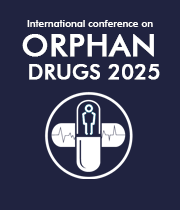Orphan Drugs 2025 _ Event Postponement
This is to inform that due to some circumstances beyond the organizer control, “2nd International Conference on Orphan Drugs and Rare Diseases” (ORPHAN DRUGS 2025) scheduled during March 13-15, 2025 in Rome, Italy has been postponed. The updated dates and venue will be displayed shortly.
Your registration can be transferred to the next edition, if you have already confirmed your participation at the event.
For further details, please contact us at orphan-drugs@magnusconference.com or call + 1 (702) 988 2320.
HYBRID EVENT: You can participate in person at Rome, Italy or Virtually from your home or work.
Orphan Drugs 2025
Will be updated soon......
Will be updated soon......


Title : Ectopically expressed olfactory receptors as an untapped family of drug targets. Discovery of agonists and antagonists of OR51E1, an understudied G protein-coupled receptor
Vladlen Slepak, University of Miami, United States
Over 30% of pharmaceuticals act on G protein-coupled receptors (GPCRs), the largest family of human genes (~800). About 50% of GPCRs (~400) are Olfactory receptors (ORs); these GPCRs were originally discovered in the nasal epithelium, where they mediate the sense of smell. [....] » Read More
Title : Personalized and Precision Medicine (PPM) as a unique healthcare model to secure the human healthcare and biosafety among childhood
Sergey Suchkov, The Russian University of Medicine & Russian Academy of Natural Sciences, Russian Federation
A new systems approach to diseased states and wellness result in a new branch in the healthcare services, namely, Personalized and Precision Medicine (PPM). Each decision-maker values the impact of their decision to use PPM on their own budget and well-being, which may not necess [....] » Read More
Title : Emerging solutions for inclusive orphan drug clinical trials management
Harsha Rajasimha, Jeeva Clinical Trials, Inc, United States
Orphan drugs, designed to treat rare diseases, face unique challenges in clinical trial management, primarily due to the small and dispersed patient populations. Inclusive orphan drug clinical trials are essential to ensure that all patient demographics benefit from these innovat [....] » Read More
Title : Novel polyphenolic compounds from Mangifera indica as promising alternatives for treating strongyloides stercoralis infections
Sergey Shityakov, ITMO University, Russian Federation
The rapid spread of Strongyloides stercoralis has raised significant public health concerns, affecting more than 600 million individuals globally. With increasing global migration, there is a potential rise in transmission, leading to the urgent need for effective treatment. To i [....] » Read More
Title : Orphan and rare disease emerging as a global public health priority through the view of personalized and precision medicine: How to use the latter to revolutionize pediatric services
Sergey Suchkov, The Russian University of Medicine & Russian Academy of Natural Sciences, Russian Federation
A new systems approach to subclinical, predictive and/or diseased states and wellness resulted in a new Hi Tech trend in the healthcare services, namely, Personalized and Precision Medicine (PPM). Meanwhile, despite breakthroughs in designed-driven research that have led to an in [....] » Read More
Title : Personalized and Precision Medicine (PPM) though the view of reproductive healthcare, pediatric services and natural family planning: an option for clinicians and caregivers realize the potential of genomics-informed care to secure the individualized human biosafety
Sergey Suchkov, The Russian University of Medicine & Russian Academy of Natural Sciences, Russian Federation
A new systems approach to diseased states and wellness result in a new branch in the healthcare services, namely, personalized and precision medicine (PPM). PPM, genomics and AI are those of the most rapidly emerging areas of biomedical research and the most promising technologie [....] » Read More
Title : The person, not the disease: emotional and social aspects of rare diseases
Marta De Santis, National Center for rare Diseases - Istituto Superiore di Sanita, Italy
Rare diseases (RDs) affect many aspects of a person and their family's life: from diagnosis to access to treatment, education, employment, socialising, and living as independently and fully as possible. RDs can have a profound psychosocial impact on patients and their fami [....] » Read More
Title : Recent advances in orphan drug development: From research to clinical application
Ali Abbaszade Cheragheali, Torbat Heydariyeh University of Medical Sciences, Iran (Islamic Republic of)
The development of orphan drugs, which are designed to treat rare diseases affecting a small percentage of the population, has seen significant advancements in recent years. This presentation aims to explore the multifaceted progress in orphan drug development, encompassing the j [....] » Read More
Title : About progeria - The ultra-rare, fatal "rapid-aging" disease - And how you can help
Audrey Gordon, The Progeria Research Foundation, United States
Ms. Gordon will give an overview of the ultra-rare, fatal, “rapid-aging” disease, Progeria, and how those in contact with a patient with a suspected case of Progeria can help them. She will discuss signs and symptoms of Progeria, global prevalence, and The Progeria Re [....] » Read More
Title : Democratizing ASO drug discovery at La Jolla Labs
Melissa Keenan, La Jolla Labs, United States
La Jolla Labs is a startup biotechnology company based in San Diego County, California, USA that values patient safety first. La Jolla Labs works to leverage RNA biology, automation, cloud computing and machine learning to deliver transformative medicine to patients with rare dis [....] » Read More